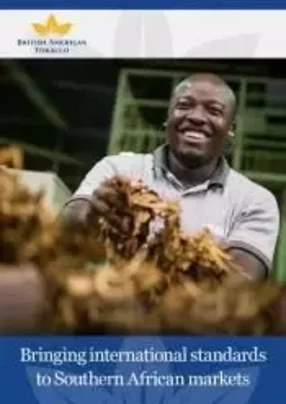Through its commitment to operational excellence, British American Tobacco (BAT) has proven healthy growth is possible, even in an increasingly competitive and regulated sector. By championing the work of its staff and supporting the communities it operates in, the company has positioned itself to continue its dominant position in Southern Africa and beyond. We spoke to Seyi Adeyemo, BAT’s Head of Supply Chain for the Southern African region, to learn more about how a company with a global remit was able to achieve this while retaining local relevance.
BAT’s operations cover every aspect of the tobacco product cycle, everything from growing the tobacco, through to manufacture, marketing and distribution to the adult consumer who gets to enjoy his or her smoking moments. Three manufacturing facilities (including one which ranks as one of the largest in the world) cover the company’s regional production requirement including exports to over 20 countries in Africa and the Middle East. Local Distribution is serviced by eight mega depots and 10 cross docks with multiple distribution networks across the country..
This supply chain directly oversee 10 markets which comprise: South Africa; Angola; Zambia; Lesotho; Botswana; Namibia; Malawi; Swaziland; Mozambique and Zimbabwe. Although focused regionally, Adeyemo said, the tobacco products manufactured at these facilities were exported globally, not to mention to the rest of the African continent.
He said: “We have a big local market in South Africa; we undertake most of the support for manufacturing, product research and regional quality management for the continent from here.”
Being part of a company with a global reach has exposed operations in Southern Africa to international standard expectations across the board, in terms of operational excellence, quality and social responsibility. Commenting on BAT’s production standards in this regard, Adeyemo said: “There is a constant focus on improving the efficiencies of our processes and operations. We do an internal benchmark first and look at best practices across the region as well as across all of our operations globally.
“We do regional and global reviews so that there is clear visibility to management from efficiency, inventory management and all the financial control requirements.”
“We also do external benchmarking, since often non-tobacco related industries also have some very good standards that can be reapplied, particularly with Lean, 6sigma and Integrated Works Systems. If there’s a best practice in another industry, we are not shy to apply it to our own.”
Mastering the African supply chain
Being the dominant tobacco company in most of the markets that it serves comes with its own challenges, not least those imposed by operating in countries where both infrastructure and legislative challenges are commonplace.
Adeyemo said: “African logistics is complex. Getting our products around can be difficult, especially because road networks and infrastructure are not always well developed. Sometimes our products have to go out by sea into Europe in order to then get back to Africa!
“This is just part of doing business on the continent and is factored into the cost of production. Planning is critical, understanding the market and understanding the culture of the markets that we go into is therefore essential.
“We need to plan how we manage our inventory, how we manage logistical lead times and how we work with different currencies to handle the volatility that exist in our business environment. We have global systems in place; we have dedicated people who understand the terrain, and we have systems that help us to predict and plan our logistics. Speed to market and availability of stock to our customers and consumers are our crucial logistical concerns in this regard.
“We work with third Partly Logistics companies across Africa who know the terrain, especially in terms of Port operations, road transport, and they move the majority of our stock for us. We work with the right partners to get our product to where we want it to be.”
Growing responsibly
Across its global operations, BAT seeks to operate in a way that not only directly create value for its shareholders, but also those stakeholders involved with its operations indirectly, particularly the communities it works in, both socially and environmentally. By factoring this into its business model, the company has received international awards alongside local recognition.
Adeyemo noted that this holistic approach began within the business itself; with our commitment to skills development and training, opportunities to progress both educationally and professionally are always available for employees looking to excel and lead those around them along the same path.
The company operates a 70:20:10 Development model (70 percent on-the-job learning, 20 percent learning through others and 10 percent formal training) which supports agile learning by encouraging individuals to identify flexible ways of acquiring knowledge and skills in relevant contexts.
On top of having to compete with other tobacco producers, BAT has to deal with all the challenges associated with the illicit tobacco trade, as well as government regulation that is sometimes inconsistent across different markets. Adeyemo was confident that the company’s competitive position enabled it to not only conquer these challenges but also to be in a position to work with governments to defeat the illicit trade.
The company’s CSR operations in its region are well-established and have received international acclaim, with focus on empowerment, sustainable agriculture and civic life. More than 77 percent of employees are from previously disadvantaged population groups and BATSA is Certified as a Top Employer in South Africa for 2015 and achieved the much coveted level 3 BBBEE compliance.
The company has been able to recycle over 95 percent of waste generated, as well as upwards of 50 percent of its water, which it also collects and feeds back into production.
By combining its might as a global operator with a dedicated focus on the needs and nuances of the markets comprising southern Africa, BAT has been able to remain one of the top tobacco companies while also proving that retaining a position as strong as this can be done so in a socially and environmentally friendly fashion.

